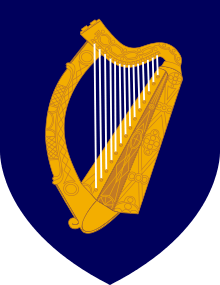Elections in the Republic of Ireland
 |
| This article is part of a series on the politics and government of the Republic of Ireland |
|
Judiciary |
|
Divisions |
|
Politics portal |
Ireland elects on national level a head of state — the president — and a legislature. The president is elected for a seven-year term by Irish citizens resident in the state (see below).
Oireachtas Éireann (the national parliament) has two chambers:
- Dáil Éireann (the house of representatives or lower house) has 166 members, elected for a term of up to five years by a quota-based single transferable vote system in multi-seat constituencies.
- Seanad Éireann (the Senate or upper house) has 60 members, 11 members nominated by the Taoiseach, 6 members elected by graduates of two universities and 43 members elected from five Vocational Panels, all in short time after the parliamentary elections.
Governments and elections have been dominated by two main parties, Fianna Fáil and Fine Gael. The electoral system provides for a form of proportional representation, with the consequence that coalition government has become the norm in recent decades. At present there are seven parties in the Oireachtas and a number of non-party representatives.
Eligibility to vote
Residents of the state who are Irish citizens or British citizens may participate in elections to the national parliament. Residents who are citizens of any EU state may vote in European Parliament elections, while any resident, regardless of citizenship, may participate in local elections.[1]
Entitlement to vote, based on citizenship:
| Resident citizens | Local elections | European elections | Dáil Elections | Presidential elections | Referendums |
|---|---|---|---|---|---|
| Irish citizens | |||||
| British citizens | |||||
| EU citizens | |||||
| Non-EU citizens |
Early voting
Military personnel, whether serving at home or abroad, vote by postal ballot. These votes are delivered by a courier service, usually a commercial one, but a military courier is used for ballots cast by Irish troops in Lebanon and Syria.[2] Voters living on islands off the west coast in Galway, Mayo, and Donegal traditionally voted two or three days before polling day, but in 2014 the gap was narrowed, when they voted just one day beforehand.[3]
General election results since 1923
Presidential elections
The President of Ireland is formally elected by the citizens of Ireland once in every seven years, except in the event of premature vacancy, when an election must be held within sixty days. The President is directly elected by secret ballot under the system of the Alternative Vote. While both Irish and UK citizens resident in the state may vote in elections to Dáil Éireann (the lower house of parliament), only Irish citizens, who must be at least eighteen years of age, may vote in the election of the President. The presidency is open to all citizens of the state who are at least 35. A candidate must, however be nominated by one of the following:
- Twenty members of the Oireachtas (national parliament).
- Four local authorities.
- Themselves (in the case of an incumbent or former president that has served only one term).
Where only one candidate is nominated, he or she is deemed elected without the need for a ballot. For this reason, where there is a consensus among political parties, the President may be 'elected' without the occurrence of an actual ballot. No one may serve as President for more than two terms.
Referendums
The Constitution of Ireland recognises two types of referendums:
There have been 38 referendums for amendments to the Constitution of Ireland. There have been no ordinary referendums.
See also
- Voting system
- Politics of the Republic of Ireland
- List of Irish by-elections
- Irish general election timetable
- Irish general election, 1918
- Irish elections, 1921 in Northern Ireland and Southern Ireland
- Irish general election, 1922 leading to the Irish Free State
- Elections in Northern Ireland
- Dáil Election Summary
References
- ↑ "System seems complicated but your vote really does matter". Irish Independent. 23 May 2014.
- ↑ "Our peacekeepers among first to cast votes". Irish Independent. 23 May 2014.
- ↑ "Defence Forces helicopter glitch delays island poll". Irish Independent. 23 May 2014.
External links
- Adam Carr's Election Archive
- Parties and elections
- NSD: European Election Database – Ireland publishes regional level election data; allows for comparisons of election results, 1992–2007
| ||||||||||||||||||||||||||||||
| ||||||||||||||||||